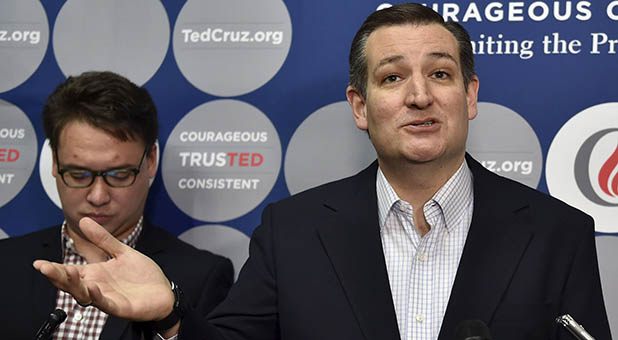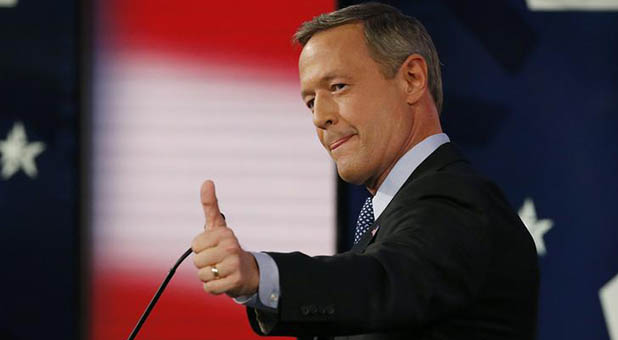Next Tuesday, nine state primaries and two caucuses with bound delegates will be held across the United States in what is being alternately billed as “Super Tuesday I” or the “SEC Primary.”
Following Tuesday evening’s third-place finish in the Nevada Caucus, U.S. Sen. Ted Cruz (R-Texas) correctly predicted it would be the most important night of the 2016 election cycle. It provides the Texas senator with his best chance of beating front-runner Donald Trump, but it will require a strategy that attracts a wide array of conservatives to his cause.
According to Real Clear Politics, Trump is leading in nine of the March 1 events, while Cruz is leading in his home state of Texas and in Arkansas. Here’s a look at each of those contests, the polling numbers, and what evangelicals who support Cruz should be prayerfully considering over the next week.
Alabama: 50 delegates
Polls open at 7 a.m. EST and close at 7 p.m. It is an open primary, whereby voters can participate in the party primary of their choice. Delegates will be awarded proportionally without a minimum threshold. The most recent polling was conducted in December, which had Trump leading Cruz by 20 points, 35-15. In 2012, the winner was Rick Santorum. In 2008, the winner was Mike Huckabee.
Georgia: 76 delegates
Polls open at 7 a.m. EST and close at 7 p.m. It is an open primary, whereby voters can participate in the party primary of their choice. Delegates will be awarded proportionally without a minimum threshold. Currently, Trump leads Rubio in the most recent polling by 10 points, 33-23, with Cruz in third at 20 percent. In 2012, the winner was Newt Gingrich. In 2008, the winner was Mike Huckabee.
Vermont: 16 delegates
Polls open throughout the morning, depending on the precinct, and close at 7 p.m. EST. It is an open primary, whereby voters can participate in the party primary of their choice. Delegates will be awarded proportionally without a minimum threshold. Currently, Trump leads Rubio in the most recent polling by 15 points, 32-17, with Cruz in third at 11 percent. In 2012, the winner was Mitt Romney. In 2008, the winner was John McCain.
Virginia: 49 delegates
Polls open at 6 a.m. EST and close at 7 p.m. It is an open primary, whereby voters can participate in the party primary of their choice. Delegates will be awarded proportionally without a minimum threshold. Currently, Trump leads Rubio in the most recent polling by 6 points, 28-22, with Cruz in third at 19 percent. In 2012, the winner was Mitt Romney. In 2008, the winner was John McCain.
Massachusetts: 42 delegates
Polls open at 7 a.m. EST and close at 8 p.m. It is a closed primary. Delegates will be awarded proportionally without a minimum threshold. Currently, Trump leads Rubio in the most recent polling by 34 points, 50-16, with Cruz in fourth at 10 percent. This is a state to watch as it could provide Trump with a delegate majority, another of the eight necessary to qualify for the GOP nomination under current RNC rules. Mitt Romney won in both 2012 and 2008.
Oklahoma: 43 delegates
Polls open at 8 a.m. EST and close at 8 p.m. It is a “modified” closed primary, whereby independent voters can participate in the party primary of their choice. Delegates will be awarded proportionally without a minimum threshold. Currently, Trump leads Cruz in the most recent polling by 5 points, 30-25, with Rubio in third at 21 percent. In 2012, the winner was Mitt Romney. In 2008, the winner was John McCain.
Tennessee: 58 delegates
Polls open at 8 a.m. EST and close at 8 p.m. It is an open primary, whereby voters can participate in the party primary of their choice. Delegates will be awarded proportionally without a minimum threshold. The most recent polling was conducted in November, so this could be a toss-up state without better polling numbers to look at. In 2012, the winner was Rick Santorum. In 2008, the winner was Mike Huckabee.
Texas: 155 delegates
The crown jewel of “Super Tuesday I,” and Cruz’ home state. Unfortunately, it’s not a winner-take-all state. Polls open at 8 a.m. EST and close at 8 p.m. It is an open primary, whereby voters can participate in the party primary of their choice. Delegates will be awarded proportionally without a minimum threshold. Currently, Cruz leads Trump by 5 points, 34-29, with Rubio in third at 20 percent. In 2012, the winner was Mitt Romney. In 2008, the winner was John McCain.
Arkansas: 40 delegates
Polls open at 8:30 a.m. EST and close at 8:30 p.m. It is an open primary, whereby voters can participate in the party primary of their choice. Delegates will be awarded proportionally without a minimum threshold. Current polling has Cruz leading Trump by 4 points, 27-23. In 2012, the winner was Mitt Romney. In 2008, the winner was Mike Huckabee.
Minnesota Caucus: 38 delegates
Precincts open at 8 p.m. EST. It is an open caucus, whereby voters can participate in the party caucus of their choice. Delegates will be awarded in a “winner-take-most” fashion whereby all of the delegates are awarded to the winner if he surpasses 50; they are awarded proportionately if he does not. The most recent polling was conducted in mid-January, and had Rubio leading Cruz by 2 points, 23-21, with Trump in third at 18 percent. In 2012, the winner was Rick Santorum. In 2008, the winner was Mitt Romney.
Alaska Caucus: 28 delegates
Precincts open at 7 p.m. EST and close at midnight. It is a closed caucus with come-and-go voting, similar to Nevada. Delegates will be awarded proportionally without a minimum threshold. The most recent polling was conducted in mid-January, and had Trump leading Cruz by 4 points. Mitt Romney won in both 2012 and 2008.
Wyoming and Colorado also host their caucuses next Tuesday, but the state’s 26 and 37 delegates, respectively, are not bound to the results of any straw poll. Instead, they are awarded based on the outcome of district and state GOP conventions.
Because almost all of the events during “Super Tuesday I” award delegates proportionately, and with five candidates still in the race, Cruz can keep up with the front-runner in each state with a solid performance. Massachusetts notwithstanding, it is unlikely any candidate will win a state delegate majority to apply toward RNC nomination rules.
Expect the Cruz and Rubio teams alike to be looking for ways to attack Trump on matters of substance that will resonate with voters in various states. A few wins can dent the current Trump narrative that he’s invincible.





